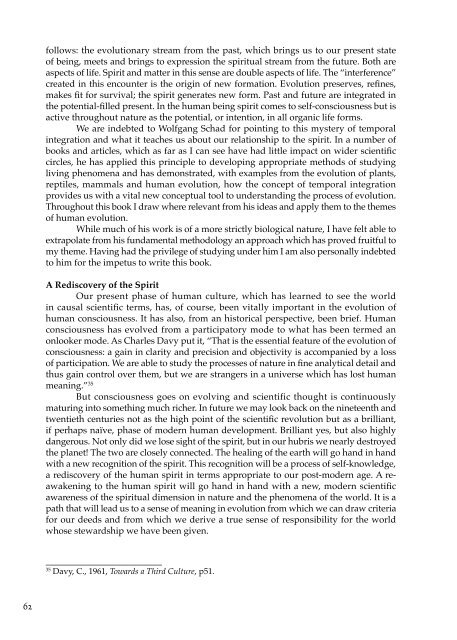The Spirit in Human Evolution - Waldorf Research Institute
The Spirit in Human Evolution - Waldorf Research Institute
The Spirit in Human Evolution - Waldorf Research Institute
Create successful ePaper yourself
Turn your PDF publications into a flip-book with our unique Google optimized e-Paper software.
follows: the evolutionary stream from the past, which br<strong>in</strong>gs us to our present state<br />
of be<strong>in</strong>g, meets and br<strong>in</strong>gs to expression the spiritual stream from the future. Both are<br />
aspects of life. <strong>Spirit</strong> and matter <strong>in</strong> this sense are double aspects of life. <strong>The</strong> “<strong>in</strong>terference”<br />
created <strong>in</strong> this encounter is the orig<strong>in</strong> of new formation. <strong>Evolution</strong> preserves, ref<strong>in</strong>es,<br />
makes fit for survival; the spirit generates new form. Past and future are <strong>in</strong>tegrated <strong>in</strong><br />
the potential-filled present. In the human be<strong>in</strong>g spirit comes to self-consciousness but is<br />
active throughout nature as the potential, or <strong>in</strong>tention, <strong>in</strong> all organic life forms.<br />
We are <strong>in</strong>debted to Wolfgang Schad for po<strong>in</strong>t<strong>in</strong>g to this mystery of temporal<br />
<strong>in</strong>tegration and what it teaches us about our relationship to the spirit. In a number of<br />
books and articles, which as far as I can see have had little impact on wider scientific<br />
circles, he has applied this pr<strong>in</strong>ciple to develop<strong>in</strong>g appropriate methods of study<strong>in</strong>g<br />
liv<strong>in</strong>g phenomena and has demonstrated, with examples from the evolution of plants,<br />
reptiles, mammals and human evolution, how the concept of temporal <strong>in</strong>tegration<br />
provides us with a vital new conceptual tool to understand<strong>in</strong>g the process of evolution.<br />
Throughout this book I draw where relevant from his ideas and apply them to the themes<br />
of human evolution.<br />
While much of his work is of a more strictly biological nature, I have felt able to<br />
extrapolate from his fundamental methodology an approach which has proved fruitful to<br />
my theme. Hav<strong>in</strong>g had the privilege of study<strong>in</strong>g under him I am also personally <strong>in</strong>debted<br />
to him for the impetus to write this book.<br />
A Rediscovery of the <strong>Spirit</strong><br />
Our present phase of human culture, which has learned to see the world<br />
<strong>in</strong> causal scientific terms, has, of course, been vitally important <strong>in</strong> the evolution of<br />
human consciousness. It has also, from an historical perspective, been brief. <strong>Human</strong><br />
consciousness has evolved from a participatory mode to what has been termed an<br />
onlooker mode. As Charles Davy put it, “That is the essential feature of the evolution of<br />
consciousness: a ga<strong>in</strong> <strong>in</strong> clarity and precision and objectivity is accompanied by a loss<br />
of participation. We are able to study the processes of nature <strong>in</strong> f<strong>in</strong>e analytical detail and<br />
thus ga<strong>in</strong> control over them, but we are strangers <strong>in</strong> a universe which has lost human<br />
mean<strong>in</strong>g.” 35<br />
But consciousness goes on evolv<strong>in</strong>g and scientific thought is cont<strong>in</strong>uously<br />
matur<strong>in</strong>g <strong>in</strong>to someth<strong>in</strong>g much richer. In future we may look back on the n<strong>in</strong>eteenth and<br />
twentieth centuries not as the high po<strong>in</strong>t of the scientific revolution but as a brilliant,<br />
if perhaps naïve, phase of modern human development. Brilliant yes, but also highly<br />
dangerous. Not only did we lose sight of the spirit, but <strong>in</strong> our hubris we nearly destroyed<br />
the planet! <strong>The</strong> two are closely connected. <strong>The</strong> heal<strong>in</strong>g of the earth will go hand <strong>in</strong> hand<br />
with a new recognition of the spirit. This recognition will be a process of self-knowledge,<br />
a rediscovery of the human spirit <strong>in</strong> terms appropriate to our post-modern age. A reawaken<strong>in</strong>g<br />
to the human spirit will go hand <strong>in</strong> hand with a new, modern scientific<br />
awareness of the spiritual dimension <strong>in</strong> nature and the phenomena of the world. It is a<br />
path that will lead us to a sense of mean<strong>in</strong>g <strong>in</strong> evolution from which we can draw criteria<br />
for our deeds and from which we derive a true sense of responsibility for the world<br />
whose stewardship we have been given.<br />
_________________________<br />
35<br />
Davy, C., 1961, Towards a Third Culture, p51.<br />
62
















